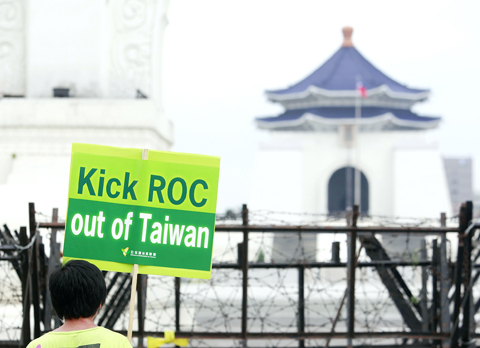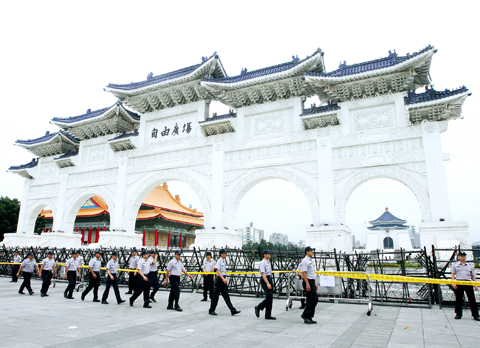The Chinese Nationalist Party (KMT) government yesterday restored dictator Chiang Kai-shek’s (蔣介石) name to National Taiwan Democracy Memorial Hall in Taipei, reversing a move two years ago by the then-Democratic Progressive Party (DPP) administration to remove relics of authoritarianism.
The replacement of the plaque began at about 8:10am after some 300 police officers secured the hall with barricades overnight and put up an official document stating that the hall would be closed for 24 hours for “official business.”
Workers cut the granite plaque bearing the title “National Taiwan Democracy Memorial Hall” that hung over the main building into pieces. The removal was completed by noon, after which workers proceeded to reinstate the Chiang plaque.

PHOTO: NICKY LOH, REUTERS
The replacement project is expected to have cost NT$1.1 million (US$33,000), said the Ministry of Education, which is in charge of the restauration.
In 2007, the DPP administration renamed the memorial National Taiwan Democracy Memorial Hall. It also changed the inscription dazhong zhizheng (大中至正) to “Liberty Square” (自由廣場) and redecorated the hall.
At the time, the pan-blue camp called the removal of Chiang’s plaque illegal, as the legislature had not abolished the Organic Act of CKS Memorial Hall (中正紀念堂組織條例) or passed a proposed act concerning the organization of the Taiwan Democracy Memorial Hall.

PHOTO: CNA
The removal of Chiang’s plaque led to physical clashes between the pan-blue and pan-green camps.
During the pan-blue-dominated legislature’s review of government budget proposals in January, lawmakers passed a resolution saying that the ministry should complete reinstatement of the Chiang plaque as soon as possible.
“We decided to reinstate the Chiang Kai-shek plaque today in accordance with the law. We also decided, after gauging the views of opinionmakers in different sectors, to retain the ‘Liberty Square’ inscription,” Vice Minister of Education Lu Mu-lin (呂木琳) told a press conference yesterday.
Lu was referring to the three forums in which academics and experts on politics, sociology, community management and urban development deliberated over how to resolve the controversy surrounding the name of the hall.
“This compromise should contribute to social harmony,” he said.
Lu said the ministry had done everything it could to properly plan and execute the plaque change, adding that on many occasions the ministry had told the public the replacement would take place this month.
“We understand that people have different memories of and emotional reactions to [Chiang], but we also hope that everyone will respect and tolerate different opinions and promote social harmony,” Lu said.
In a press release, the ministry said it supported the creation of a hall to showcase the nation’s efforts at democratization.
“But replacing the Chiang plaque with National Taiwan Democracy Memorial Hall in an illegal and undemocratic fashion was not a manifestation of Taiwan’s democracy. Instead, it was ironic,” it said.
DPP Taipei City Councilor Chuang Ruei-hsiung (莊瑞雄) was forcefully evicted after he slipped through the barbed wire barricades. A small number of pro-independence supporters shouted “police violence” and “death to Dictator Ma” as police took him away.
At 2pm, only 11 protesters remained at the sit-in, including two Buddhist monks, an elderly man and a small child.
Screaming anti-Ma slogans, protesters compared Ma to Adolf Hitler and said the KMT government was no different from the Nazi Party in its oppression of Taiwanese.
“If the KMT really believes that what it is doing is righteous, then why does it have to remove the plaque like a thief in the middle of the night?” said Peter Wang (王獻極), a leading member of the Taiwan Nation Alliance.
The protesters laid out banners showing pictures of the execution orders signed off by Chiang during his reign.
Two American tourists who declined to give their names asked why there were so few protesters Chiang was the cruel dictator many have accused him of being.
“If someone was to erect a statue of a Ku Klux Klan leader in the US, you bet you would for sure see a huge turn out of demonstrators, both black and white folks,” one said.
Wang said he rushed to the memorial after learning about the change on TV, adding that this probably accounted for the low protester turnout.
Executive Yuan Spokesman Su Jun-pin (蘇俊賓) said that the Executive Yuan respected due procedure and differing opinions.
KMT Legislator Shuai Hua-ming (帥化民) lauded the ministry’s move, saying it was following legislative resolution.
DPP Chairperson Tsai Ing-wen (蔡英文) condemned the change, saying the party could not condone a “measure under which the nation’s public assets are used to commemorate a dictator who slaughtered his own people.”
Chiang was responsible for the massacre that began on Feb. 28, 1947 — known as the 228 Massacre — in which as many as 20,000 people were killed by KMT troops.
“President Ma Ying-jeou (馬英九) said renaming CKS Memorial Hall was a public issue that should be decided by the public. But his government … replaced the hall name in sneaky fashion,” Tsai said.
DPP Legislator Wang Sing-nan (王幸男) told a separate press conference that Ma’s paying tribute to Chiang and restoring the name to CKS Memorial Hall would spark ethnic controversy and rub salt on Taiwan’s historical wounds.
Chuang criticized the Taipei City Police Department for wasting public resources by mobilizing at least 600 officers to fend off protesters.
Aside from 600 officers deployed at the hall, Zhongzheng First Police District Director Chen Ming-cheng (陳銘政) said there were around 300 others in the nearby area, including all MRT exits.
Chen said that the number of officers deployed was “completely in line with protocol.”
“Out of concern over possible riots, CKS hall management asked Taipei City police provide the necessary assistance,” he said, confirming that the district had received the request on Sunday.
Taipei Mayor Hau Lung-bin (郝龍斌) said later yesterday that the police deployment was one-tenth the size deployed when then DPP government renamed the hall, although police in 2007 said there were around 600 officers deployed. Hau also said the hall was under the jurisdiction of the Ministry of Education and city police were merely responding to a request.
Japanese tourist Emi Fukuda and her companions said yesterday they were disappointed when they realized tourists were barred from entering the memorial.
ADDITIONAL REPORTING BY RICH CHANG AND STAFF REPORTER

AIR SUPPORT: The Ministry of National Defense thanked the US for the delivery, adding that it was an indicator of the White House’s commitment to the Taiwan Relations Act Deputy Minister of National Defense Po Horng-huei (柏鴻輝) and Representative to the US Alexander Yui on Friday attended a delivery ceremony for the first of Taiwan’s long-awaited 66 F-16C/D Block 70 jets at a Lockheed Martin Corp factory in Greenville, South Carolina. “We are so proud to be the global home of the F-16 and to support Taiwan’s air defense capabilities,” US Representative William Timmons wrote on X, alongside a photograph of Taiwanese and US officials at the event. The F-16C/D Block 70 jets Taiwan ordered have the same capabilities as aircraft that had been upgraded to F-16Vs. The batch of Lockheed Martin

GRIDLOCK: The National Fire Agency’s Special Search and Rescue team is on standby to travel to the countries to help out with the rescue effort A powerful earthquake rocked Myanmar and neighboring Thailand yesterday, killing at least three people in Bangkok and burying dozens when a high-rise building under construction collapsed. Footage shared on social media from Myanmar’s second-largest city showed widespread destruction, raising fears that many were trapped under the rubble or killed. The magnitude 7.7 earthquake, with an epicenter near Mandalay in Myanmar, struck at midday and was followed by a strong magnitude 6.4 aftershock. The extent of death, injury and destruction — especially in Myanmar, which is embroiled in a civil war and where information is tightly controlled at the best of times —

China's military today said it began joint army, navy and rocket force exercises around Taiwan to "serve as a stern warning and powerful deterrent against Taiwanese independence," calling President William Lai (賴清德) a "parasite." The exercises come after Lai called Beijing a "foreign hostile force" last month. More than 10 Chinese military ships approached close to Taiwan's 24 nautical mile (44.4km) contiguous zone this morning and Taiwan sent its own warships to respond, two senior Taiwanese officials said. Taiwan has not yet detected any live fire by the Chinese military so far, one of the officials said. The drills took place after US Secretary

THUGGISH BEHAVIOR: Encouraging people to report independence supporters is another intimidation tactic that threatens cross-strait peace, the state department said China setting up an online system for reporting “Taiwanese independence” advocates is an “irresponsible and reprehensible” act, a US government spokesperson said on Friday. “China’s call for private individuals to report on alleged ‘persecution or suppression’ by supposed ‘Taiwan independence henchmen and accomplices’ is irresponsible and reprehensible,” an unnamed US Department of State spokesperson told the Central News Agency in an e-mail. The move is part of Beijing’s “intimidation campaign” against Taiwan and its supporters, and is “threatening free speech around the world, destabilizing the Indo-Pacific region, and deliberately eroding the cross-strait status quo,” the spokesperson said. The Chinese Communist Party’s “threats